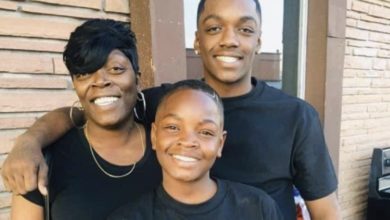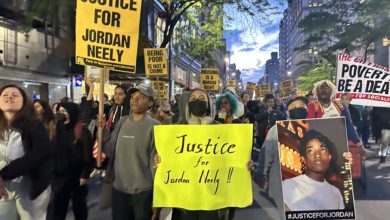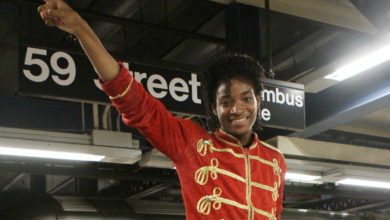
Revolutionary journalist Mumia Abu-Jamal has been a political prisoner since 1981, when he was arrested for shooting a cop. He has maintained his freedom and is demanding a new trial to prove his innocence. Tens of thousands have demonstrated for his freedom.
Increasing mass pressure resulted in a December 2001 ruling overturning Abu-Jamal’s death sentence. He is still fighting to admit evidence that proves his innocence in the shooting.
New legal developments show that Mumia is still is danger—and that activists need to prepare to mobilize to defend his life and win his freedom. The following is a July 4 statement by the International Concerned Family and Friends of Mumia Abu-Jamal detailing the developments in his case.
On June 29, 2004, the U.S. Court of Appeals for the Third Circuit lifted its stay in regard to consideration of any material in the case of Mumia Abu-Jamal. The court had been awaiting a decision of the U.S. Supreme Court in the case of Beard v. Banks which could have resulted in the reinstatement of the death penalty against Mumia.
Indeed, while Mumia’s lead attorney Robert R. Bryan told the ICFFMAJ that, “The decision in the Banks case clearly does not effect Mumia’s case and the death penalty does not apply,” state prosecutors in Pennsylvania have taken the opposite position, arguing that the Banks decision affirms the state’s order to execute Mumia and that Mumia must remain on death row. Both sides have been given 30 days to submit briefs on this single issue.
Following a determination, Bryan will additionally submit Mumia’s appeal of the 2001 U.S. District Court regarding racist jury selection practices and later, additional appeals of the District Court’s rulings on a wide range of issues.

Bryan summed up the impact of the latest developments: “Mumia’s case is now moving forward on the fast track. He is in grave danger. Pennsylvania state authorities want to silence his voice and pen and are pressing hard once again for the death penalty. They originally thought this could be accomplished by convicting this innocent man, placing him on death row and executing him. They have been proven wrong. Mumia’s voice against injustice and oppression is now stronger. It is heard and read throughout the world. In over three decades of litigating death-penalty cases, I have not seen one in which the government wants so badly to kill a client. We are confident that Pennsylvania’s effort to execute Mumia will once again fail. We are confident that we will win his freedom.”
The June 29 U.S. Court of Appeals briefing order came on the heels of a June 24, 2004, U.S. Supreme Court decision in the case of Beard v. Banks. Mr. Bryan explained that Beard v. Banks is a complicated case. The Supreme Court ruled on the appeal by Pennsylvania state authorities stemming from a Court of Appeals decision that invalidated the death sentence of George Banks, who has been on death row over 20 years for multiple counts of murder. Mr. Banks’ death sentence had been overturned by the Court of Appeals on the grounds that the instructions to the jury in Banks’ case violated a Supreme Court ruling which held that jurors did not have to agree unanimously on the existence of mitigating circumstances in order to vote against the death penalty. The key issue in the Banks case was whether another case, Mills v. Maryland, 486 U.S. 367 decided in 1988 could be applied retroactively. The Court of Appeals for the Third Circuit had ruled that Mills was retroactive and therefore applied to Banks, which became final in 1987.
In Mumia’s case, retroactivity regarding Banks/Mills was not an issue since Mumia’s proceeding was technically finalized in 1990 and therefore was fully covered by Mills.
On June 24, in a 5-4 decision written by Justice Clarence Thomas, the U.S. Supreme Court reversed a critical portion of the Mills/Banks case, which held as unconstitutional capital sentencing schemes that require juries to disregard mitigating factors not found unanimously. The Supreme Court ruled that Mills did not apply retroactively. The court determined that the Banks conviction became final in 1987, thus the 1988 Mills decision did not affect his case even though what had occurred was unconstitutional. Hence, Mr. Banks and some 30 other Pennsylvania death row inmates similarly situated could not benefit from the Mills decision and their original death penalty judgments must stand.
Mr. Bryan pointed out that Supreme Court Justice Stevens, joined by Justices Souter, Ginsburg, and Breyer, strongly dissented.
Justice Stevens said that the “use of such a procedure is unquestionably unconstitutional today, and I believe it was equally so in 1987 when respondent’s death sentence became final.” He further explained that “Mills simply represented a straightforward application of our longstanding view that ‘the Eighth and Fourteenth Amendments cannot tolerate the infliction of a sentence of death under [a] legal syste[m] that permit[s] the unique penalty to be . . . wantonly and . . . freakishly imposed.'” Justice Souter said that “a death sentence based upon a verdict of 11 jurors who would have relied on a given mitigating circumstance to spare a defendant’s life, and a single holdout who blocked them from doing so, would surely be an egregious failure to express the public conscience accurately.”
He found that too much importance is given “to the finality of capital sentences and not enough to their accuracy.”
There are other legal developments concerning the fight to free Mumia. Robert Bryan is awaiting a ruling on a petition that he filed in the trial court, the Court of Common Pleas, Philadelphia, concerning new evidence of innocence and prosecutorial fraud. This concerns evidence presented by Yvette Evette Williams demonstrating that the prosecution’s chief “eyewitness,” Cynthia White, was not present at the murder scene of Police Officer Daniel Faulkner and that Williams lied in regard to her identification of Mumia Abu-Jamal as the killer.
Bryan will also appeal the decision of the U.S. District to deny certificates of appealability in regard to a number of issues where Mumia’s fundamental constitutional rights were violated, including his right to be present at his own trial and his right to self-representation.

Additionally, he will seek to appeal a Pennsylvania Supreme Court decision rejecting Mumia’s request that Pennsylvania Supreme Court Justice Ronald Castille recuse (remove) himself from the panel considering Mumia’s case on the grounds that Castille had served as a prosecutor in the same case. Bryan noted that Castille, a former Pennsylvania District Attorney, had authorized a secret training video that instructed state prosecutors as to how to eliminate Blacks from Pennsylvania juries.
Finally, Bryan will also be attempting to go back into the federal court regarding the statement by the trial judge, Albert Sabo, who said during the trial in reference to Mumia: “Yeah, and I’m going to help ’em fry the n****r.”
Photo: Bill Hackwell
Photo: Bill Hackwell
April 1999, famed percussionist Babatunde Lea leads thousands in march to free Mumia.
Photo: Bill Hackwell






